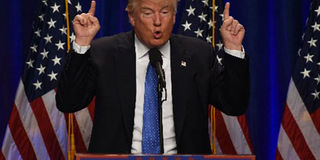Trump appears bent on turning massacre to his advantage

Republican presidential candidate Donald Trump speaks at the Saint Andelm College New Hampshire Institute of Politics in Manchester, New Hampshire in the US June 13, 2016. PHOTO | TIMOTHY A. CLARY | AFP
What you need to know:
- Presumptive Republican nominee unleashed a broadside accusing President Barack Obama and his would-be Democratic successor Clinton of failing to tackle what Trump calls radical Islam.
WASHINGTON, Tuesday
White House hopeful Donald Trump appeared bent on exploiting Sunday’s massacre in Orlando to boost the argument that he can be trusted to tackle terrorism over rival Hillary Clinton.
With police still probing the suspected Islamist ties of the slain gunman, Mr Trump wasted no time in harnessing the assault to his political advantage.
The presumptive Republican nominee unleashed a broadside accusing President Barack Obama and his would-be Democratic successor, Mrs Clinton, of failing to tackle what Mr Trump calls radical Islam.
“Because our leaders are weak, I said this was going to happen—and it is only going to get worse,” he said in a statement. “I am trying to save lives and prevent the next terrorist attack. We can’t afford to be politically correct anymore.”
Mr Trump is set to deliver more of the same tough talk at a campaign appearance in Manchester, New Hampshire on Monday. The speech was originally to be about Mrs Clinton, but he is shifting the focus to national security.
His other Monday event, in Portsmouth, has been scrapped, his campaign said. As the country reeled from what is being treated as the deadliest attack on US soil since September 11, 2001, Tim Malloy, assistant director of the Quinnipiac University poll, said the threat of terrorism was likely to dominate the US campaign debate.
“It will be at the forefront until election day,” he told AFP.
After extremists slaughtered 130 people in Paris last November and a Muslim husband-and-wife team murdered 14 in San Bernardino, California, Mr Trump called for a ban on Muslims entering the United States.
The move prompted an uproar, but he doubled down, presenting himself as prepared to do more to crack down on extremism than his political rivals.
After San Bernardino, “It became a permanent part of the Trump dialogue,” said Quinnipiac’s Mr Malloy.
In March, following a deadly attack in Brussels, Mr Trump said his insistence on defeating extremism was “probably why I’m number one in the polls”.
Opinion polls late last year showed a majority of Republicans supporting Mr Trump’s call for a Muslim travel ban.
Mr Trump and Mrs Clinton are promoting radically different approaches to fighting terror, and have traded accusations that the other is not fit to run the country.
Mr Trump has repeatedly called for a halt to refugee flows from the Middle East, and assailed Clinton for wanting to expand them.





